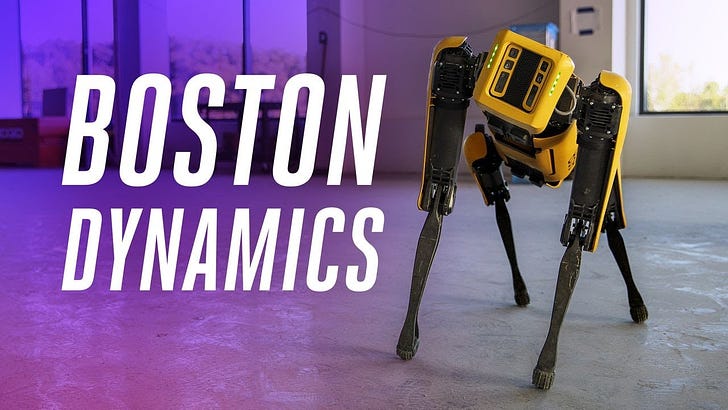Greetings,
Here’s what I found interesting in innovation / technology / finance last week.
Want to get this update emailed to you each week? Sign up here.
🤖 Robots
Boston Dynamics is best known for the videos they’ve been uploading of their robot prototypes for the past decade. Now the company is finally releasing one of them for public consumption: Spot.
Spot is a four-legged dog-like robot that operates with a high degree of autonomy. It’s modular, so you can add additional sensors and additional appendages like arms to open doors. The company is planning to lease the robot to companies that will explore what potential real-world use case are. Most early suggestions seem to revolve around using Spot to fulfill an inspection or patrol function, but there’s also talk of the robot joining Cirque du Soleil... The Verge has an on-hands review of Spot (5 minutes).
Google researchers have come up with a better way to teach a robot hand how to manipulate objects with its fingers with a method that cuts the training time significantly. For example, the training required to learn how to turn a valve took 2.5 hours under their method, a significant improvement from the 22 hours it took under previous state-of-the-art methods.
The New Yorker wrote a fascinating article called Paging Dr. Robot about the future of robotic surgery. The piece featured Pier Giulianotti, Professor of Surgery at University of Illinois at Chicago, who has now performed roughly three thousand procedures with the aid of a robot.
“I felt the small robotic hands of the robot were a prolongation of my own. If you are used to having flat vision, and you pass into 3-D, you feel you are immersed inside the human body. It was a fantastic journey—the interior of the anatomy, the shadow of little vessels and nerves. I immediately fell in love.”
NASA is working on shape-shifting robots to explore Saturn’s moon Titan. They’re still very early stage.
German robotics company KUKA have opened an ice cream bar in Melbourne staffed 100% by robots.
🛰️ Space
Elon Musk provided an update on Starship, SpaceX’s first rocket designed to carry people. He expects an orbital test flight to come within six months and thinks we could see people flying next year (which seems unlikely). Right now the first passenger trip is expected to be a round-the-moon flight in 2023 which was previously sold to Yusaku Maezawa, the billionaire founder of Japanese online fashion mall Zozotown. SpaceX continues to study using Starship for fast earth-to-earth travel, such as London to Sydney in 51 minutes if you can handle it.
SpaceX aren’t the only ones looking at earth-to-earth flights. The UK Space Agency is talking about potentially flying from London to Sydney in under 30 minutes (by the 2030s) using the Synergetic Air-Breathing Rocket Engine (SABRE) from Oxfordshire-based Reaction Engines.
👓 Virtual & Augmented Reality
Last week Facebook held its annual virtual reality event, Oculus Connect 6. Most announcements were about improving the Oculus Quest, their all-in-one gaming headset (and my favourite VR headset). New features coming to the Quest include hand tracking (interact with the virtual world without a controller), Oculus Link (lets you connect the Quest to a PC to play more powerful Oculus Rift games), and Passthrough on Demand (lets you switch to seeing the real-world at any time).
They also talked about progress on enabling mixed reality, which refers to bringing in parts of the real world into the virtual world. For example, you could import your real keyboard, mouse, and desk into the virtual workspace and use them as easily as you would in the real world.
Sandra Humbles, vice president of global education solutions at the Johnson & Johnson Institute, talked about how effective VR training was for surgeons and how they want to make VR training available to every surgeon in the world.
You can see more about the event from this VentureBeat summary, along with this CNET 12-minute video summary.
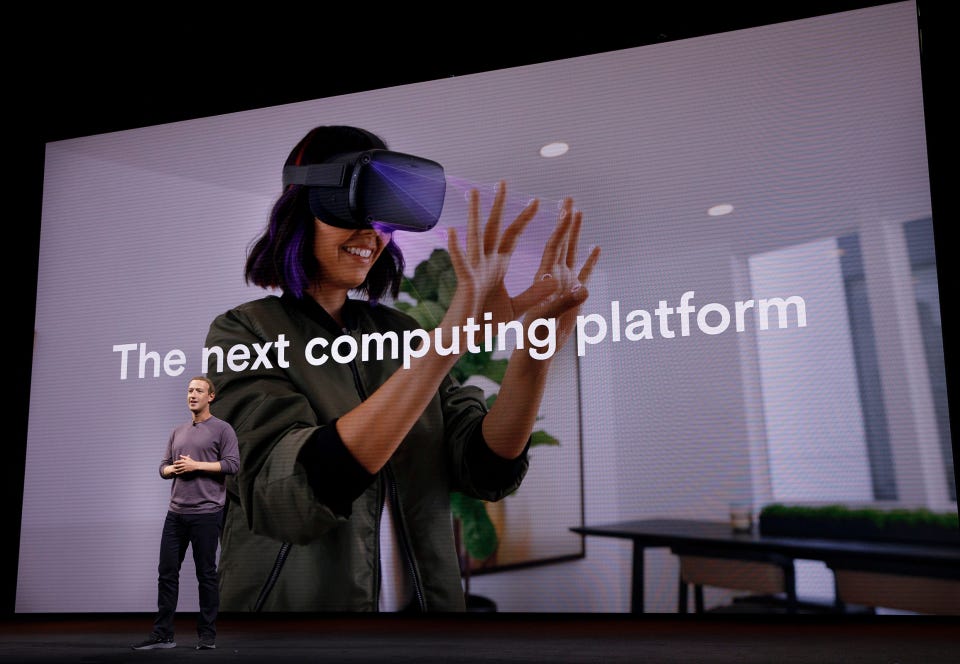
Facebook also announced they plan to build augmented reality glasses, but there’s no release date yet.
Amazon announced Echo Frames, which are $180 smart glasses with a microphone and speakers built-in to let you talk to Alexa wherever you are.
Swimmers are using augmented reality goggles to track their time and distance as they swim.
💲 Finance
Unprofitable companies are raising the most IPO cash since the dot com era, reaching $29.9 billion with 3 months left to go.
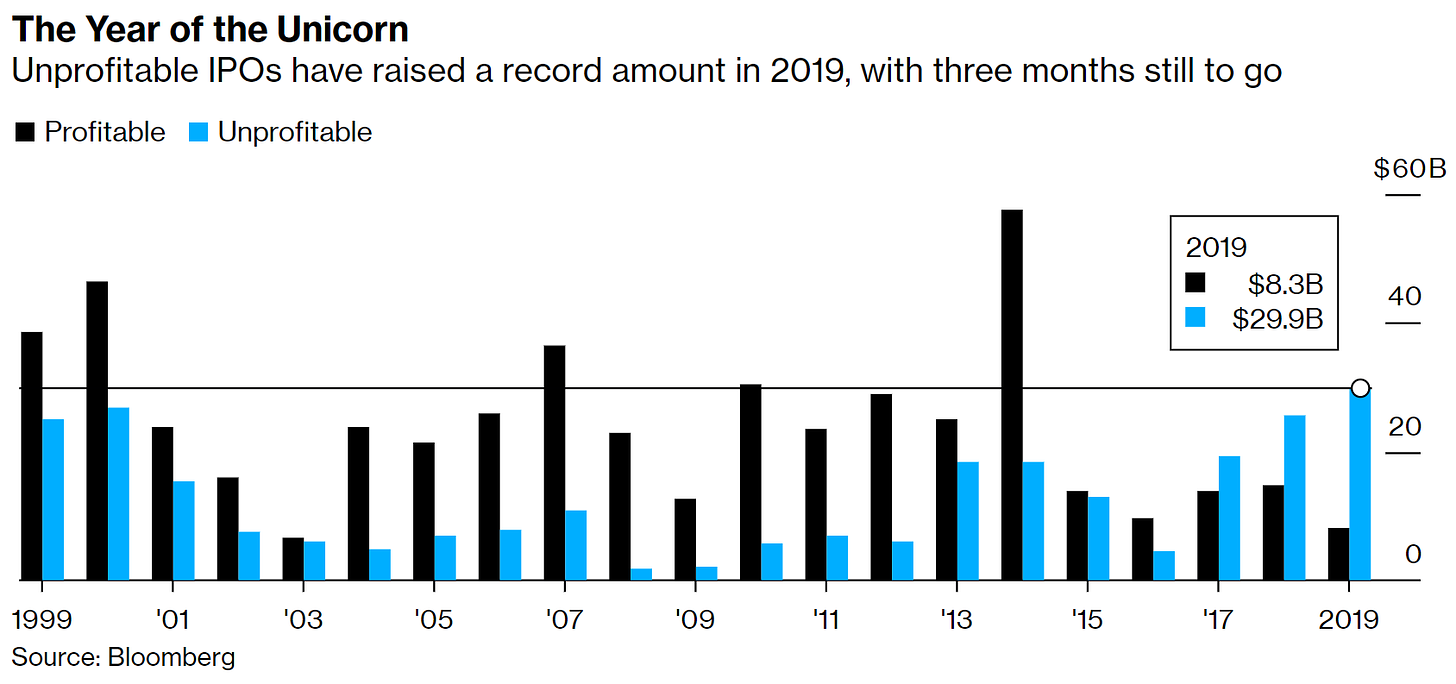
Jumia Technologies, the “Amazon of Africa”, is no longer a unicorn after falling substantially from its IPO price.
🌞 Climate Change and Renewables
Australia is the runaway global leader in building new renewable energy. Between 2018 and 2020, Australia will install more than 16 gigawatts of wind and solar, an average rate of 220 watts per person per year.
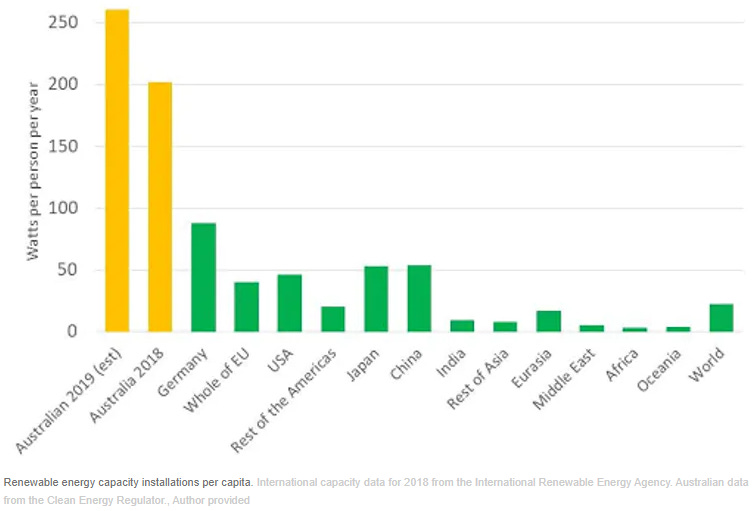
Atlassian co-founder Mike Cannon-Brookes is investing in a $25 billion project to create the world’s biggest solar farm, its biggest power storage system, and a 3000-kilometre cable to export energy from Australia to Asia.
⚡ Other Snippets
Qualcomm shared a practical vision for 5G’s first 5 years. Earliest use-cases include 8K videos, video conferencing, and low-latency games.
A future avocado crisis may be averted by modifying avocado genes to make them more drought resistant.
In the early 1990s, a young Australian chef named Bill Granger had a bright idea: Why not spread avocado on toast?
As synthetic DNA becomes cheaper, keeping it out of the wrong hands is getting harder. Features comments from James Diggans, Twist Bioscience’s Director of Biosecurity.
A handful of times, they've said no. Diggans won't give specifics on those occasions. He does note that they would not have made the pieces of DNA that one research team recently ordered from a different company and used to assemble horsepox virus.
That was controversial because horsepox is so close to the deadly human pathogen smallpox. "That is not something we would have been comfortable in producing," says Diggans.
Facebook acquired brain-computer interface technology startup CTRL-Labs Inc. The company has created a wristband that reads electrical multiple impulses from the brain which are then converted into a digital signal a computer can respond to.
A different group is working on picking up brain signals from a strip on the back of your neck.
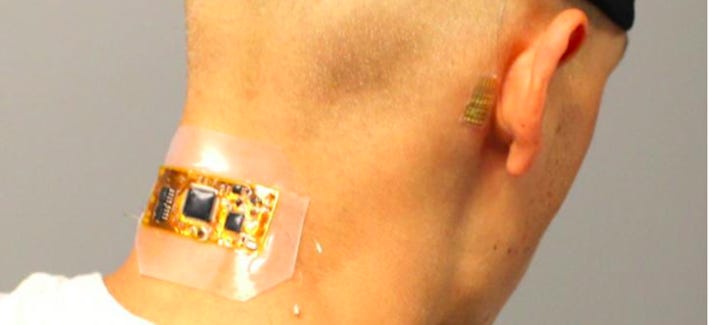
Alibaba has released the Hanguang 800, a homegrown AI chip dedicated to large-scale inferencing. This is the first semiconductor chip Alibaba has ever released, and it will be applied to multiple scenarios from image and video classification to smart city applications. At peak performance, the Hanguang 800 can classify almost 80,000 images per second, making it 15 times more powerful than the NVIDIA T4 GPU. Like Google’s TPUs, Alibaba has no plans to sell the Hanguang 800, but will make it available to rent for users of its cloud service.
China has unveiled a 500 megapixel camera that can identify individuals from crowds of tens of thousands.
Louis Vuitton has made a move into esports. The luxury fashion brand will be creating the trophy travel case for 2019 League of Legends World Championship, and its creative director for women’s collections, Nicolas Ghesquière, will be designing several unique outfits that can be used by characters in the game.
Interested in learning more about “quantum supremacy” after the Google story last week? Here’s a useful Quantum Supremacy FAQ by Scott Aaronson.
Ford has begun testing autonomous cars in Austin.
McDonald’s will begin testing plant-based Beyond Meat burgers in 28 restaurants in Canada for 12 weeks. Beyond Meat stock rose 12%.
That’s it for this week’s wrap. I’m now off to Cairns and the Great Barrier Reef for a holiday. Hope you have a great week!

Thomas
About Thomas Rice
Thomas Rice is the portfolio manager for the Perpetual Global Innovation Share Fund, based in Sydney, Australia. You can find him on Twitter at @thomasrice_au.

